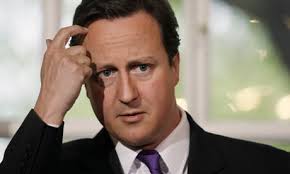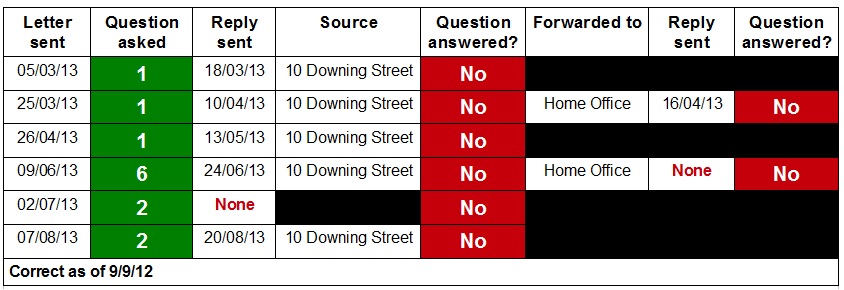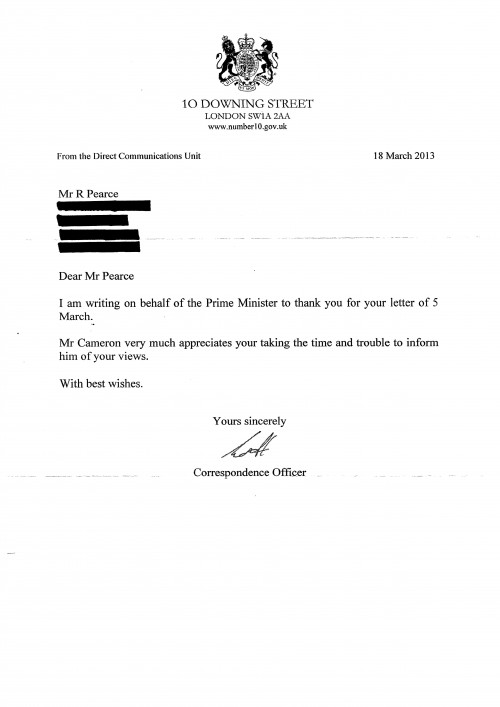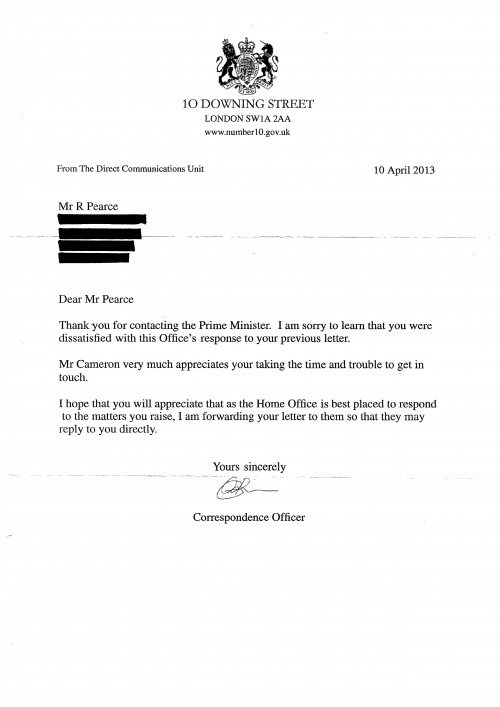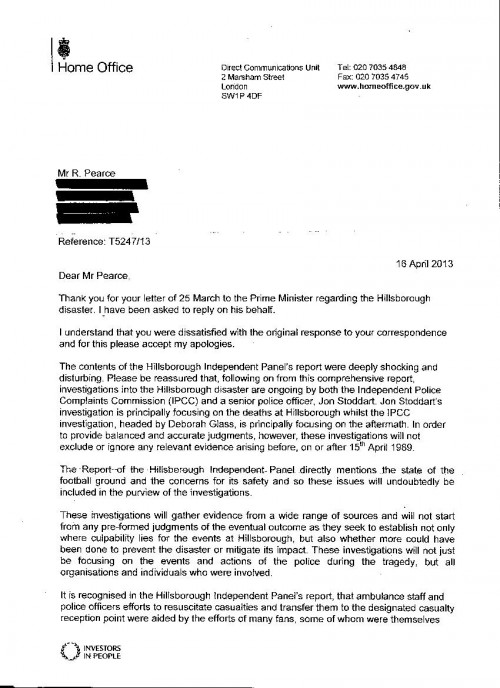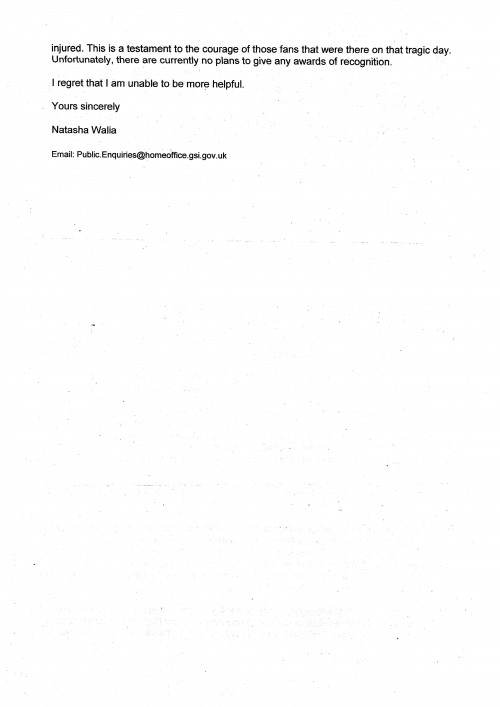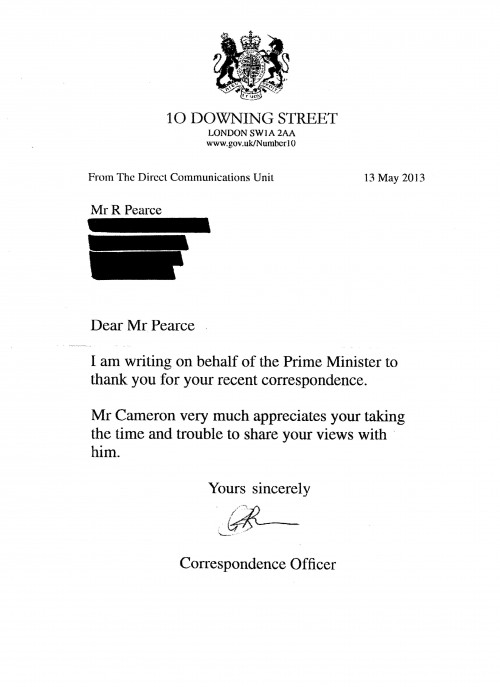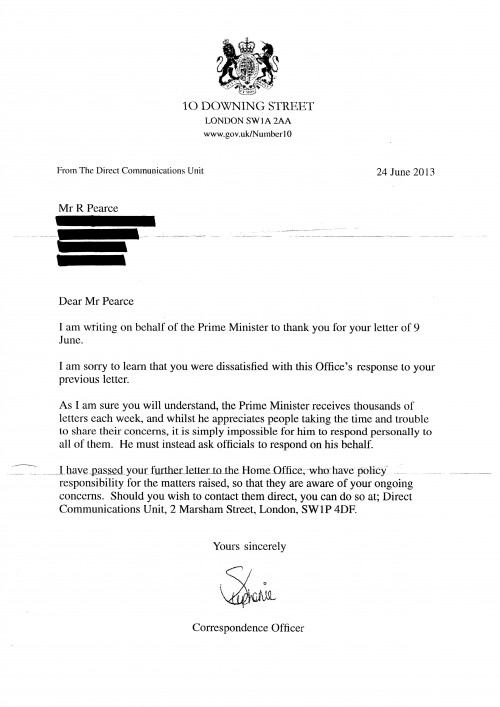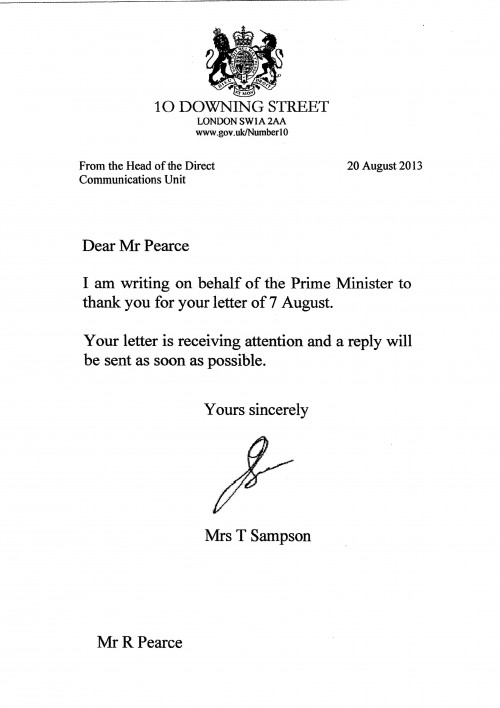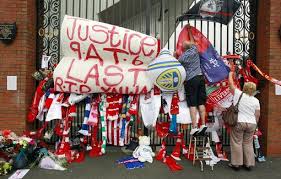By Bob Pearce.
As many of TTT’s subscribers will know, Bob has been mounting a campaign to have the Liverpool supporters at Hillsborough officially recognised as heroes for their part in what happened whilst those whose job it was to help stood back.
His persistent letter-writing has repeatedly been blocked by the Prime Minister’s Office and the Home Office. Here Bob charts his campaign to date.
Mr Cameron. Hillsborough Heroes? Yes or No?
Since Mr Cameron made the following statement to parliament on 12/9/12, I have come to question the sincerity and doubt the credibility of his words:
“Mr Speaker, I want to be very clear about the view the government takes about these findings and why after 23 years this matters so much, not just for the families but for Liverpool and for our country as a whole. Mr Speaker what happened that day – and since – was wrong. It was wrong that the responsible authorities knew Hillsborough did not meet minimum safety standards and yet still allowed the match to go ahead. It was wrong that the families have had to wait for so long – and fight so hard – just to get to the truth. And it was wrong that the police changed the records of what happened and tried to blame the fans.
The new evidence that we are presented with today makes clear that these families have suffered a double injustice. The injustice of the appalling events – the failure of the state to protect their loved ones and the indefensible wait to get to the truth. And the injustice of the denigration of the deceased – that they were somehow at fault for their own deaths.
On behalf of the government – and indeed our country – I am profoundly sorry for this double injustice that has been left uncorrected for so long. Mr Speaker, because of what I have described as the second injustice – the false version of events – not enough people in this country understand what the people of Merseyside have been through.
This appalling death toll of so many loved ones lost was compounded by an attempt to blame the victims. A narrative about hooliganism on that day was created which led many in the country to accept that it was somehow a grey area. Today’s report is black and white. The Liverpool fans ‘were not the cause of the disaster’.”
On that same day, Hillsborough survivor Peter Carney observed that “The actions of the Liverpool fans that day were absolutely fantastic. It was one of the greatest acts of spontaneous humanity that this country has ever witnessed and it is time that this was recognised.” Mr Cameron’s words were widely reported. Peter Carney’s were not.
On 11/3/13 I wrote to Mr Cameron to raise this issue:
Dear Mr Cameron
On 12th September 2012 you offered a “profound apology” on behalf of the whole country for the “double injustice” experienced by the families of those who died in the Hillsborough tragedy. I’d suggest a third injustice remains which you have still yet to address.
The news media, which had spent the previous 23 years dismissing campaigners’ calls for the truth to be told, were quick to adopt the sound bite of ‘First Truth, then Justice’. I have not yet seen one instance of any commentator making the case of ‘First Truth, then Justice, and finally Recognition’.
Thousands of ordinary fans of all ages set off that day to watch a game of football. These ordinary people found themselves thrust into the most traumatic of circumstances without warning. That terrible afternoon those ordinary people rose up and did something truly extraordinary.
It was not unreasonable for the people attending the match that afternoon to expect that the Football Association would have wanted to ensure that the stadium had a safety certificate. There was no certificate.
It was not unreasonable for them to expect that the police would have wanted to ensure their safety. Their lives were put in peril.
It was not unreasonable for them to expect that the ambulance service would have wanted to come to their aid. They did not come.
It was not unreasonable for them to expect that the media would have wanted to report the truth about the disaster. They printed lies.
It was not unreasonable for them to expect that politicians would have wanted to act in their interests as their elected representatives. They perpetuated a cover-up.
It was not unreasonable for them to expect that the legal system would have wanted to ensure justice. They discredited and dismissed their evidence.
I can only presume that these public servants chose careers in these professions because they wished to protect and serve the public. Their actions on that day, and in the weeks, months and years that have followed will have only undermined the public’s trust and confidence in the institutions they represent. There are many who should spend their remaining days with their heads bowed in the deepest shame for the enormous damage they have inflicted on the very integrity of these institutions.
We have seen the pictures and videos from that day many times. What they show is at once shocking and amazing. What we see is that overwhelmingly it was the fans that provided whatever help they could, while those who were paid, trained and co-ordinated to provide that assistance appear to be little more than passive observers. Ordinary men and women stepped forward and took action to help fellow human beings in their darkest hour. The evidence shows that, for whatever reason, public servants, who were trained and paid to be on duty that day, chose to take a different path. They can be seen standing by and watching the heroic efforts of the football fans effectively being left to fend for themselves.
Even if they were being led and co-ordinated by trained professionals, the actions of these ordinary people would have been considered exceptional. But on that terrible day, the fact that they acted despite the almost total indifference of those they expected to come to their assistance is nothing short of heroism of the very highest order.
Thankfully there were many people that did the right thing that day. They didn’t do the right thing because it was their job. They didn’t do they right thing because they were instructed to. They did the right thing because they were simply honest, decent and moral human beings. In the heat of the moment they would have been unaware of the full scale of the disaster they’d found themselves engulfed in. They simply focussed on what they could do for the individual in front of them that needed their help. This unskilled group of individuals, without leadership or co-ordination of any kind, took it upon themselves to rise up with only one thought in their mind – to do whatever they could to help total strangers, in the same way that they would have wanted to have been helped themselves.
They may say they simply ‘did what they could’. They may tell you that they ‘did what anybody else would have done in that situation’. Some will have been haunted in the years since by the doubts about whether they ‘could have done more’. I would tell them that they were part of the most incredible peace time act of unorganised mass heroism that this country has ever witnessed.
This totally selfless wish to do whatever they could to help a total stranger in their darkest hour, when all seemed lost, should be recognised and commemorated for what it really was – evidence of the wonderful spirit of humanity that resides within ordinary people in this country.
I can only presume that their remarkably selfless actions have been overlooked and dismissed because they took place within the context of the co-ordinated and self-interested efforts of corrupt public servants to cover-up their errors.
On 15th April, 24 years will have passed, and five different Prime Ministers will have failed to give the appropriate recognition to these unnamed heroes for their extraordinary actions. Do you want to lead a country which for a quarter of a century has failed to recognise those whose actions showed the very best of the human spirit?
I believe that a day will come Mr Cameron, perhaps in a more enlightened time than our own, when future generations will look back on these events and be both staggered and appalled that not only were they were allowed to happen, and that public servants put their own interests ahead of those they served, but also that the heroic and selfless actions of so many men and women went unrecognised for what they were. This unprecedented spontaneous demonstration of humanity is a moment in our country’s history for which the whole nation ought to feel enormous pride, and should serve as a source of inspiration for future generations. It is a terrible indictment of so many of our public servants that almost a quarter of a century has passed since that day and still it remains unrecognised.
Like ‘Chernobyl’, unfortunately ‘Hillsborough’ is one of those place names which will forever be associated with disaster. As the full scale of the public servants failings is revealed, like ‘Watergate’ it will also become a short-hand for widespread institutional corruption. You have it in your power to ensure that, in time, ‘Hillsborough’ will also be associated with all that is best about the selfless and heroic capacity of ordinary people in this country.
The names of the 96 who did not come home that Spring afternoon will always be remembered. The Hillsborough Independent Panel concluded that 41 of those fatalities may have still been with us today if they had received prompt medical treatment from the public servants on duty that day. It is also reported that 766 survivors were also injured that afternoon. Ask yourself this question Mr Cameron – How high would the death toll have been that afternoon had it not been for the extraordinary actions of these ordinary men and women?
Will the Right Honourable Gentleman not answer the question?
I have now written to Mr Cameron six times since March. I have asked him the same simple question thirteen times: Mr Cameron, do you agree that the actions of the ordinary men and women at Hillsborough on 15th April 1989 deserve recognition in the form of a collective award in the same manner as other heroic acts? Yes or No?
He has never answered that simple question.
In subsequent letters I have added;
“How have these heroes been treated? They have been actively discredited as witnesses and had their evidence dismissed in order to support the self-serving needs of the institutional corruption that is now finally being exposed. For 24 years since the Hillsborough tragedy it has been clear that it was simply politically inconvenient to give the due recognition to the actions of those ordinary men and women whose heroism in those traumatic circumstances was of the highest order. For 24 years this inconvenient truth was entirely inconsistent with the despicable narrative constructed by the police, press, and politicians to serve their own selfish ends.” (9/6/13)
“Since 12/9/12, when the extent of that cover-up was brought to light, there has been an opportunity to address this disgraceful treatment of those who should be held up as role models by formally recognising their part in the most incredible peace time act of unorganised mass heroism that this country has ever witnessed. Sadly, you have chosen to simply belittle and dismiss their actions. Describing their heroic actions as merely ‘aiding the efforts’ of police officers and ambulance staff maintains the 24 year old narrative of relegating these remarkable people to little more than mere ‘extras’, when actually they were not just centre stage, their actions were in fact an inspirational example to us all.” (26/4/13)
“The continued refusal on your part to answer my simple question suggests that, sadly, despite your public apology on 12/9/12, such formal recognition may remain a politically inconvenient truth.”(9/6/13)
“The actions of the Hillsborough Heroes were plain for everyone to see almost a quarter of a century ago. They have clearly been dismissed for all these years by those with a corrupt self-serving interest in misrepresenting them. If a similar tragedy occurred today there would be no hesitation in honouring those whose selfless action serve as an example to us all.” (25/3/13)
“I have been advised by one of your colleagues that they believe it is “invidious” to compare the heroes of Hillsborough to other examples of ordinary men and women being recognised for their actions in comparable circumstances. For example, in 2008 six people were formally recognised for their heroic actions at the time of the London bombings in 2005. Given your statement on 12/9/12 that the Hillsborough disaster was “one of the greatest peacetime tragedies of the last century”, I would suggest that it is actually invidious to not compare them.” (26/4/13)
“It may help to put aside the label of ‘football fan’, and remember that at Hillsborough these were also simply ordinary men and women that found themselves thrust into the most extraordinary and traumatic circumstances without warning. They too stepped forward and came to the aid of strangers in their hour of need because it was the right thing to do. I’d suggest what makes the actions of those at Hillsborough utterly unique is that they actually took place despite what you referred to in your statement on 12/9/12 as the “shortcomings” of the police and ambulance services.” (26/4/13)
Mr Cameron, do you agree that the actions of the ordinary men and women at Hillsborough on 15th April 1989 deserve recognition in the form of a collective award in the same manner as other heroic acts? Yes or No?
Realistically I know that I may have to accept that there may be a number of plausible explanations for Mr Cameron’s failure to answer this one simple question thirteen times.
1) Mr Cameron did not see the letters and they were read by administrative staff.
It is clear from all five dismissive replies I have received that Mr Cameron did not see any of my letters. However, all of these letters from Downing Street and the Home Office stated that they were written ‘on behalf of the Prime Minister’.
2) The question was passed to the Home Office, which was the relevant government department to answer.
The Home Office replied ‘on the Prime Minister’s behalf’ on 16/4/13 using the basic distracting and dismissive technique of providing information while not answering the question that they had been asked. I am aware of five versions of what is effectively a standard Hillsborough ‘template’ letter being signed by various public servants. I wrote to Mr Cameron on 26/4/13 to tell him this ‘template’ letter did not answer the question.
3) It is not appropriate for the Prime Minister to intervene in due process.
If this is his view then could he not have simply said so? On 2/7/13 I wrote to Mr Cameron to say that such a claim had been undermined on 22/4/13 when he ‘saw fit to find the time to comment on the behaviour of a footballer in their capacity as a role model. Your response to suggestions that you were in some way interfering in a matter that should be addressed through due process, was to say that you spoke “as a dad and a human being”. Surely, as that same ‘dad and human being’, you would also want to make your views known on the far more important, positive and inspirational role models that are the Hillsborough heroes. You have already made it plain that you do not feel that making such public comments has any impact or influence on the official bodies charged with carrying out due process.’
It could also be argued that he may set a better example ‘as a dad and a human being’ by making his views known on Chief Constable Sir Norman Bettison and the impact of his actions on the public’s confidence in the police. Or even MP Sir Irvine Patnick and the impact of his actions on the public’s confidence in elected representatives.
4) It is not right for the Prime Minister to make statements about who may be considered for honours.
This might make sense, but on 8/7/13 Mr Cameron was reported as backing tennis player Andy Murray for a knighthood following his victory at Wimbledon, and was quoted as saying that he “can’t think of anyone who deserves one more”. He was either not thinking hard enough, which is an insult to far more deserving people, or he was being flippant, which is also an insult to those that have received honours.
5) Mr Cameron has not given recognition to anybody connected with the Hillsborough disaster.
This might be an explanation, but on 14/6/12 his Birthday Honours list included an OBE for Mrs Elizabeth Ridley (Families and Business Support Manager, Hillsborough Team, Home Office) “for services to the Hillsborough Investigation Panel”. This was just 38 weeks after the publication of the panel’s report. And yet, at that time 1,256 weeks had passed since the Hillsborough tragedy and still there has been no similar recognition of the truly heroic actions of ordinary men and women witnessed that day.
6) Mr Cameron is not avoiding the question, it is the Home Office that wrote the letter.
This might be acceptable if Mr Cameron had not personally signed a version of the Hillsborough ‘template’ letter on 14/5/13 in reply to Mark Hunter MP forwarding a constituent’s letter asking the same question. So Mr Cameron has chosen to adopt the basic distracting and dismissive technique of providing information while not answering the question he had been asked.
7) Mr Cameron was not aware that the Hillsborough ‘template’ letter failed to answer the question.
This might have been believeable, but when he signed his version of the letter on 14/5/13, I had already written three weeks earlier on 26/4/13 to clearly state that the standard Hillsborough ‘template’ letter failed to answer the question and asked the question again. The reply that he sent to Mark Hunter is effectively the same letter that was sent to me by Natasha Walia from the Home Office on 16/4/13. It is effectively the same letter sent by Damien Green from the Home Office to Ben Wallace MP on 17/4/13 in response to a constituent asking the same question. It is effectively the same letter also sent by Damien Green MP to Andrew Murrison MP on 13/5/13 in response to a constituent asking the same question. It was also sent by Theresa May at the Home Office to Michael Moore MP in response to a constituent asking the same question.
I have now read this same Hillsborough ‘template’ letter five times, signed by four different public servants, all of whom appear to believe it is acceptable to use the distraction and dismissal technique. It is far from clear who actually wrote this ‘template’ letter, or how many other public servants have signed versions of it. What is perfectly clear though is that the letter does not answer the question that was asked.
Despite all this, on 24/6/13 a letter was written “on behalf of the Prime Minister” informing me that “I have passed your further letter to the Home Office”. This question had previously been referred to the Home Office on numerous occsions, and each time a standard Hillsborough ‘template’ letter, which does not answer the simple question, has been sent in response. I thought it would be foolish on my part to expect anything but a further copy of this same standard Hillsborough ‘template’ letter from the Home Office. I was mistaken. In fact I have received no response whatsoever from the Home Office since 24/6/13.
I think any reasonable person would find it increasingly hard to not wonder if there is a reason why Mr Cameron has chosen to avoid answering this very simple question thirteen times.
Mr Cameron, do you agree that the actions of the ordinary men and women at Hillsborough on 15th April 1989 deserve recognition in the form of a collective award in the same manner as other heroic acts? Yes or No?
So, what did I expect Mr Cameron to say? What about “Thank you for your letter, I completely agree with what you say and I will raise your points when I get the opportunity.” Is that too much to expect from an elected representative? To be frank I’d have greater respect for Mr Cameron if he had simply answered ‘No’, rather than spending six months avoiding giving an answer to the question.
After six letters, the same question asked 13 times, and still no answer, what does that suggest about Mr Cameron’s views on the Hillsborough tragedy? There seem to me to be a number of possible conclusion that can be reached.
Could it be that Mr Cameron believes it is acceptable for elected representatives to insult the intelligence of the electorate with dismissive responses to questions?
Could it be that it remains as politically inconvenient today to give the deserved recognition to the Heroes of Hillsborough as it was in the immediate aftermath more than 24 years ago?
Within his speech on 12/9/12 Mr Cameron said that “South Yorkshire police is a very different organisation today from what it was then”. David Compton, Chief Constable of South Yorkshire police was also quoted on 12/9/12 as saying “I am profoundly sorry for the way the force failed” and that “in 2012 South Yorkshire police is a very different place than it was in 1989”. The sincerity of his apology and pledge have since been revealed as cynically false due to the content of an email he sent to senior staff just days before which stated that the families’ “version of certain events has become ‘the truth’ even though it isn’t.”
Within his speech on 12/9/12 Mr Cameron singled out Andy Burnham MP for his role in setting up the Independent Hillsborough Panel. Less than a year earlier on 25/10/11, Mr Cameron was qouted as describing the families’ campaign for truth as being “like a blind man, in a dark room, looking for a black cat that isn’t there.” He was also quoted that day as saying “It was this government that agreed to release the Hillsborough documents. Yet, every time I hear the word Hillsborough, I see Andy Burnham on the TV.”
Andy Burnham MP, who responded to a copy of the initial letter of 5/3/13 saying “Thank you for your letter, I completely agree with what you say and I will raise your points when I get the opportunity.”
Since Mr Cameron made his statement to parliament on 12/9/12, I have come to question the sincerity and doubt the credibility of his words. Before a quarter of a century passes since that terrible day at Hillsborough, I think it is reasonable to expect the following speech from Mr Cameron to Parliament.
“Mr Speaker, I want to be very clear about the view the government takes about these findings and why after 24 years this matters so much, not just for the heroes but for Liverpool and for our country as a whole. Mr Speaker what happened that day – and since – was wrong. It was wrong that the responsible authorities knew Hillsborough did not meet minimum safety standards and yet still allowed the match to go ahead. It was wrong that the families have had to wait for so long – and fight so hard – just to get to the truth. And it was wrong that the police changed the records of what happened and tried to blame the fans. The new evidence that we are presented with today makes clear that these Heroes of Hillsborough have suffered a double injustice. The injustice of the appalling events – the failure of the state to protect them and the indefensible wait to get to the truth. And the injustice of the denigration of the heroes – that they were somehow at fault for others’ deaths.
On behalf of the government – and indeed our country – I am profoundly sorry for this double injustice that has been left uncorrected for so long. Mr Speaker, because of what I have described as the second injustice – the false version of events – not enough people in this country understand what the people of Merseyside went through and demonstrated that afternoon. This appalling death toll of so many loved ones lost was compounded by an attempt to blame the victims. A narrative about hooliganism on that day was created which led many in the country to accept that it was somehow a grey area. The report is black and white. The Liverpool fans ‘were not the cause of the disaster’. They were the Heroes of Hillsborough”.
Copies of all the replies from Downing Street and The Home Office:
